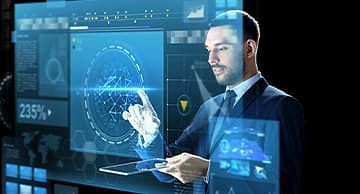Data Science Skills you will learn
- Business analytics
- R programming and its packages
- Data structures and data visualization
- Apply functions and DPLYR function
- Graphics in R for data visualization
- Hypothesis testing
- Apriori algorithm
- kmeans and DBSCAN clustering
Who should learn Data Science with R
- Data Scientist
- Data Analyst
- IT Professionals
- Software Developers
What you will learn in Data Science with R Program
Data Science with R Programming
Lesson 00 - Course Introduction
08:36Course Introduction
01:31Accessing Practice Lab
07:05
Lesson 01 - Introduction to Business Analytics
21:061.001 Overview
00:441.002 Business Decisions and Analytics
04:331.003 Types of Business Analytics
03:531.004 Applications of Business Analytics
08:571.005 Data Science Overview
01:291.006 Conclusion
01:30Knowledge Check
Lesson 02 - Introduction to R Programming
26:352.001 Overview
00:312.002 Importance of R
05:202.003 Data Types and Variables in R
02:142.004 Operators in R
04:392.005 Conditional Statements in R
02:452.006 Loops in R
05:072.007 R script
01:442.008 Functions in R
02:582.009 Conclusion
01:17Knowledge Check
Lesson 03 - Data Structures
50:573.001 Overview
01:043.002 Identifying Data Structures
13:143.003 Demo Identifying Data Structures
14:053.004 Assigning Values to Data Structures
04:513.005 Data Manipulation
09:233.006 Demo Assigning values and applying functions
07:463.007 Conclusion
00:34Knowledge Check
Lesson 04 - Data Visualization
26:254.001 Overview
00:294.002 Introduction to Data Visualization
03:034.003 Data Visualization using Graphics in R
15:354.004 ggplot2
05:144.005 File Formats of Graphic Outputs
01:084.006 Conclusion
00:56Knowledge Check
Lesson 05 - Statistics for Data Science-I
14:105.001 Overview
00:215.002 Introduction to Hypothesis
02:065.003 Types of Hypothesis
03:135.004 Data Sampling
02:485.005 Confidence and Significance Levels
04:335.006 Conclusion
01:09Knowledge Check
Lesson 06 - Statistics for Data Science-II
29:556.001 Overview
00:286.002 Hypothesis Test
00:476.003 Parametric Test
14:366.004 Non-Parametric Test
08:316.005 Hypothesis Tests about Population Means
02:096.006 Hypothesis Tests about Population Variance
00:456.007 Hypothesis Tests about Population Proportions
01:116.008 Conclusion
01:28Knowledge Check
Lesson 07 - Regression Analysis
45:047.001 Overview
00:267.002 Introduction to Regression Analysis
01:117.003 Types of Regression Analysis Models
01:387.004 Linear Regression
08:597.005 Demo Simple Linear Regression
07:297.006 Non-Linear Regression
03:497.007 Demo Regression Analysis with Multiple Variables
13:297.008 Cross Validation
01:487.009 Non-Linear to Linear Models
02:067.010 Principal Component Analysis
02:457.011 Factor Analysis
00:267.012 Conclusion
00:58Knowledge Check
Lesson 08 - Classification
01:05:148.001 Overview
00:318.002 Classification and Its Types
04:248.003 Logistic Regression
03:358.004 Support Vector Machines
04:268.005 Demo Support Vector Machines
11:138.006 K-Nearest Neighbours
02:348.007 Naive Bayes Classifier
02:538.008 Demo Naive Bayes Classifier
06:158.009 Decision Tree Classification
09:478.010 Demo Decision Tree Classification
06:258.011 Random Forest Classification
02:018.012 Evaluating Classifier Models
06:048.013 Demo K-Fold Cross Validation
04:098.014 Conclusion
00:57Knowledge Check
Lesson 09 - Clustering
28:109.001 Overview
00:179.002 Introduction to Clustering
02:579.003 Clustering Methods
07:479.004 Demo K-means Clustering
11:159.005 Demo Hierarchical Clustering
05:029.006 Conclusion
00:52Knowledge Check
Lesson 10 - Association
23:1310.001 Overview
00:1510.002 Association Rule
06:2010.003 Apriori Algorithm
05:1910.004 Demo Apriori Algorithm
10:3710.005 Conclusion
00:42Knowledge Check
Get a Completion Certificate
Share your certificate with prospective employers and your professional network on LinkedIn.
Course Advisors
Why you should learn Data Science with R
$40.6 billion by 2023
expected growth of big data analytics market
50% higher salary
than the the rest of the IT industry as per Randstad report
Career Opportunities
- Average Salary
$43K - $95K Per Annum
Hiring Companies






- Average Salary
$83K - $154K Per Annum
Hiring Companies




FAQs
What are the prerequisites to learn the Data Science with R basics program?
There are no prerequisites to take this Data Science with R basics program. However, knowledge of any programming language and core mathematics would be an added advantage.
How do beginners learn data science basics?
Beginners can learn about Data Science by getting an overview of business analytics, how data-driven decisions help achieve more profits, and a broad understanding of how data is analyzed.
How long does it take to learn Data Science with R?
Professionals with a technical background and some prior knowledge of Data Science tend to progress faster in learning Data Science. Beginners can also achieve a similar pace by taking this Data Science R basics free course, as it helps you learn the basics from scratch.
What should I learn first in the Data Science with R free course?
Data Science learners can first get a basic understanding of statistics, core math concepts, data manipulation, and data analysis in this free course.
Are Data Science with R basics program easy to learn?
This Data Science with R basics free course has been designed keeping different learner needs in mind. Learners who don’t have any clear idea about data science can still follow this program easily.
What is Data Science used for?
Companies are widely using Data Science to gain meaningful insights from their customer data and make more informed decisions for building their products. It involves a range of processes right from collecting data, cleaning, processing to data analysis, and data visualization.
Related Courses
- Disclaimer
- PMP, PMI, PMBOK, CAPM, PgMP, PfMP, ACP, PBA, RMP, SP, and OPM3 are registered marks of the Project Management Institute, Inc.
 (
(